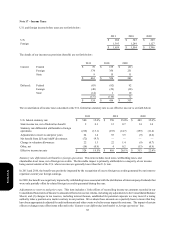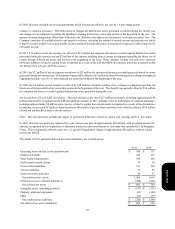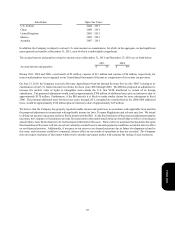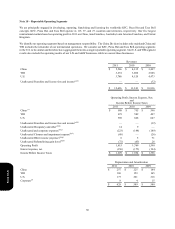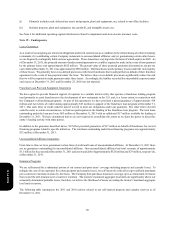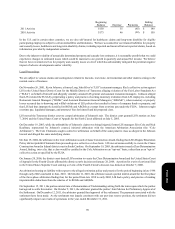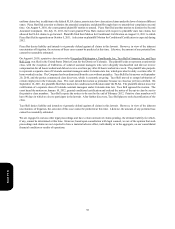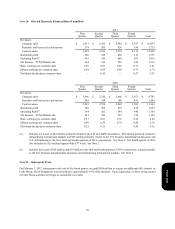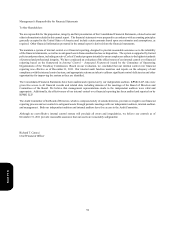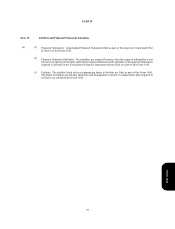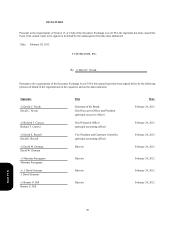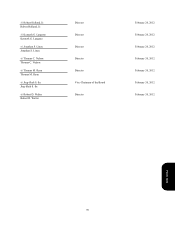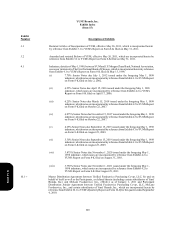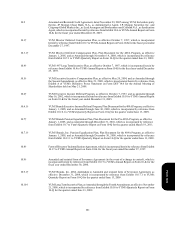Pizza Hut 2011 Annual Report Download - page 195
Download and view the complete annual report
Please find page 195 of the 2011 Pizza Hut annual report below. You can navigate through the pages in the report by either clicking on the pages listed below, or by using the keyword search tool below to find specific information within the annual report.
91
California Supreme Court regarding the applicable standard for employer provision of meal and rest breaks. Plaintiff filed an
opposition to that motion on November 19, 2010. On January 14, 2011, the District Court granted KFC's motion and stayed the
entire action pending a decision from the California Supreme Court. No trial date has been set.
KFC denies liability and intends to vigorously defend against all claims in this lawsuit. However, in view of the inherent
uncertainties of litigation, the outcome of this case cannot be predicted at this time. Likewise, the amount of any potential loss
cannot be reasonably estimated.
On December 17, 2002, Taco Bell was named as the defendant in a class action lawsuit filed in the United States District Court
for the Northern District of California styled Moeller, et al. v. Taco Bell Corp. On August 4, 2003, plaintiffs filed an amended
complaint that alleges, among other things, that Taco Bell has discriminated against the class of people who use wheelchairs or
scooters for mobility by failing to make its approximately 220 company-owned restaurants in California accessible to the class.
Plaintiffs contend that queue rails and other architectural and structural elements of the Taco Bell restaurants relating to the path
of travel and use of the facilities by persons with mobility-related disabilities do not comply with the U.S. Americans with Disabilities
Act (the “ADA”), the Unruh Civil Rights Act (the “Unruh Act”), and the California Disabled Persons Act (the “CDPA”). Plaintiffs
have requested: (a) an injunction from the District Court ordering Taco Bell to comply with the ADA and its implementing
regulations; (b) that the District Court declare Taco Bell in violation of the ADA, the Unruh Act, and the CDPA; and (c) monetary
relief under the Unruh Act or CDPA. Plaintiffs, on behalf of the class, are seeking the minimum statutory damages per offense
of either $4,000 under the Unruh Act or $1,000 under the CDPA for each aggrieved member of the class. Plaintiffs contend that
there may be in excess of 100,000 individuals in the class.
On February 23, 2004, the District Court granted plaintiffs' motion for class certification. The class includes claims for injunctive
relief and minimum statutory damages.
On May 17, 2007, a hearing was held on plaintiffs' Motion for Partial Summary Judgment seeking judicial declaration that Taco
Bell was in violation of accessibility laws as to three specific issues: indoor seating, queue rails and door opening force. On August
8, 2007, the court granted plaintiffs' motion in part with regard to dining room seating. In addition, the court granted plaintiffs'
motion in part with regard to door opening force at some restaurants (but not all) and denied the motion with regard to queue lines.
On December 16, 2009, the court denied Taco Bell's motion for summary judgment on the ADA claims and ordered plaintiff to
file a definitive list of remaining issues and to select one restaurant to be the subject of a trial. The exemplar trial for that restaurant
began on June 6, 2011. The trial was bifurcated and the first stage addressed whether violations existed at the restaurant. Twelve
alleged violations of the ADA and state law were tried. The trial ended on June 16, 2011. On October 5, 2011, the court issued
its trial decision. The court found liability for the twelve items, finding that they were once out of compliance with applicable
state and/or federal accessibility standards. The court also found that classwide injunctive relief is warranted. The court declined
to order injunctive relief at this time, however, citing the pendency of Taco Bell's motions to decertify both the injunctive and
damages class. In a separate order, the court vacated the December 12, 2011 date previously set for an exemplar trial for damages
on the single restaurant.
On June 20, 2011, the United States Supreme Court issued its ruling in Wal-Mart Stores, Inc. v. Dukes. The Supreme Court held
that the class in that case was improperly certified. The same legal theory was used to certify the class in the Moeller case, and
Taco Bell filed a motion to decertify the class on August 3, 2011. During the exemplar trial, the court observed that the restaurant
had been in full compliance with all laws since March, 2010, and Taco Bell argues in its decertification motion that, in light of
the decision in the Dukes case, no damages class can be certified and that injunctive relief is not appropriate, regardless of class
status. On October 19, 2011, plaintiffs filed a motion to amend the certified class to include a damages class. Discovery regarding
the putative damages class is proceeding, after which the parties will complete briefing on Taco Bell's motion to decertify and
plaintiffs' motion to amend the class.
Taco Bell denies liability and intends to vigorously defend against all claims in this lawsuit. Taco Bell has taken steps to address
potential architectural and structural compliance issues at the restaurants in accordance with applicable state and federal disability
access laws. The costs associated with addressing these issues have not significantly impacted our results of operations. It is not
possible at this time to reasonably estimate the probability or amount of liability for monetary damages on a class wide basis to
Taco Bell.
On July 9, 2009, a putative class action styled Mark Smith v. Pizza Hut, Inc. was filed in the United States District Court for the
District of Colorado. The complaint alleged that Pizza Hut did not properly reimburse its delivery drivers for various automobile
costs, uniforms costs, and other job-related expenses and seeks to represent a class of delivery drivers nationwide under the FLSA
and Colorado state law. On January 4, 2010, plaintiffs filed a motion for conditional certification of a nationwide class of current
and former Pizza Hut, Inc. delivery drivers. However, on March 11, 2010, the court granted Pizza Hut's pending motion to dismiss
for failure to state a claim, with leave to amend. On March 31, 2010, plaintiffs filed an amended complaint, which dropped the
Form 10-K



